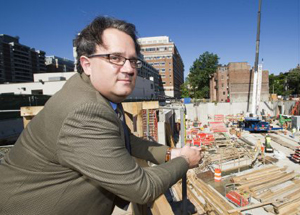Tagged: writing assistance
Stumbling over Statistics?
At BU, there’s a resource center for students who are confounded by chemistry, hysterical over history, or otherwise in need of an academic assist.
By Mariana Ramirez Navarrete (COM’13)
It’s the night before your first final exam and maybe you haven’t started studying yet. You have a paper due, a lab report, and you still want to go to the gym, catch dinner with friends, and watch the latest episode of Glee. You’re stressed; you’re worried; and you don’t want to leave your room in the freezing weather.
We all know that life as a Terrier isn’t always easy, but we sometimes make it more difficult for ourselves with poor study habits and procrastination. Luckily, there are some professionals on campus who are more than happy to help students correct those mistakes and take some of the stress out of achieving academic success.
“Adults that you are,” Glenn Wrigley tells me, “you need to take responsibility for yourselves and find the help you need to succeed.”

Glenn Wrigley, director, overlooks the site of the new home of the Educational Resource Center at Boston University. Photo by Cydney Scott
Wrigley is the director of the Educational Resource Center at Boston University (ERC). A one-stop shop for students seeking to boost their grades, the ERC offers free tutoring, writing assistance, skill workshops, and other academic lifelines.
As a junior in the College of Communication, I’m embarrassed to admit that, while I was aware of the ERC’s existence, until recently I had not taken advantage of the tools it provides. Looking back now, I’m sure I could have made things much easier for myself if I had sought aid when I first felt the workload getting out of hand. Especially when I realized how much harder college really is than high school, and that my studying techniques had to change accordingly.
“Students often get to BU and they hit the ground running,” says Wrigley. “They’re not used to seeing C’s, and they feel comfortable with their studying methods. It’s not until after that first test or paper comes back that they look for help.”

The ERC is always ready with that help, offering a range of services, from individual tutoring sessions and writing labs, to foreign-language group talks and workshops in time management. There’s even a prep course to give students a head start on handling those dreaded organic chemistry assignments. And in addition to professional assistance, the ERC also features a peer-mentoring program, in which top-notch, faculty-recommended upperclassmen provide the individualized support many students need to succeed in a specific class or subject. Located on the fourth floor of the George Sherman Union, the ERC is every Terrier’s go-to resource when a class seems too much to handle.
Of course, the center’s staff can only point a student in the right direction. Wrigley says it’s critical that both parents and students know that in the end, each student is responsible for his or her own success: “Students need to get connected to faculty and administrators on campus. The quicker they can do that, the more likely they’ll be successful.”
Originally intended as a peer-mentoring center, the ERC has certainly evolved over its twenty-year history, adding services designed to aid students across their various academic endeavors. “The center soon took a prominent role among the student body,” said Wrigley. “We try very hard to get our message across to students, especially new students.”
Along with stressing the importance of personal responsibility, Wrigley maintains that the role of parents in a college student’s academic life should be minimal. Parents should educate themselves about the resources available on campus, but the decision to utilize those tools has to be the student’s. “Never call and make an appointment for your student,” Wrigley says. “That’s not the kind of help they need.”
Parents can help, however, by encouraging their students to talk to the people at the ERC about their academic careers. “That way, they can’t use the ‘No one ever told me’ excuse,” Wrigley points out. Urge students to work with the center staff to design a strong and effective studying method. After all, it’s easy to feel overwhelmed when facing a full slate of rigorous courses, and the ERC can bolster students as they navigate their schedules of papers, presentations, take-home quizzes, and looming midterms and finals.
Whether it’s through assisting students in improving their writing styles and techniques, or by offering them the opportunity to sit in on a foreign-language conversation led by a native speaker, the ERC is sure to supply your child with targeted, practical help. The important step is walking through the center’s doors—that’s the way toward better academic performance. ■






